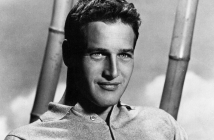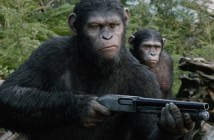10. Yoo Jun-sang in In Another Country
Despite Isabelle Huppert being the conspicuous odd-woman-out in Hong Sang-soo’s multipronged romantic farce In Another Country, frequent Hong veteran Yoo Jun-sang is the real stand-out and exemplary scene-stealer in an extremely funny supporting part. He plays a likeably forthright wannabe Lothario lifeguard who hits on Huppert as a visiting Frenchwoman in three distinct, non-overlapping narratives. His wooing in broken English is deadpan hilarity in all three stories, captured in long shot as his clumsy come-ons compete visually against a simple wind-beaten tent. Goofy and pitied but noble in his unpretentious longing, he stands out amidst Hong’s usual strong examination of damaged male-female relationships. In this light film with a distinct undercurrent of sadness and deception, Yoo plays the most delightfully transparent character with the most straightforward aims, a comic creation of entrancing particularity but with the resonance of a classic stock figure.
9. Helene Bergsholm in Turn Me On, Dammit!
In the debut feature for both writer/director Jannicke Systad Jacobsen and star Helene Bergsholm, Turn Me On, (God)Dammit!, fifteen-year-old Alma is caught in the throes of sexual awakening in her dead-end Norwegian town. Plagued by unending horniness and rampant fantasies, she unfortunately finds herself ostracized due to a droll comic mishap involving a guy she likes (Matias Myren). Together, Jacobsen and Bergsholm mine the female coming-of-age in the rarely-attempted farcical mode, poking fun yet sympathizing with the uncontrolled awkwardness against the rampant hypocrisy leveled against teenage, especially feminine, desire. In an astonishingly assured first performance on film, Bergsholm has a quirky beauty and an appealing self-consciousness, looking like an innocent blonde Scandinavian everygirl but tempering that image from her initial appearance onscreen, enthusiastically pleasuring herself on the kitchen floor with a phone sex line feeding her encouragement. She struggles to navigate not only her internal drives but the unstintingly antagonistic universe of high school popularity, briefly paused by an escape to the big city where such petty concerns become the stuff of jokey songs and not silenced friendships. Time will tell if Bergsholm can find another project or collaborator as fresh or as sympathetic as Turn Me On or Jacobsen, but with this performance as a calling card she is surely one of the newcomer actresses of the year.
 8. Joaquin Phoenix in The Master
8. Joaquin Phoenix in The Master
Alternately a titanic struggle and synthesis of wills, Paul Thomas Anderson’s sprawling yet intimate The Master centers around the tumultuous relationship between wayward naval vet Freddie Quell (Phoenix) and domineering cult leader Lancaster Dodd (Philip Seymour Hoffman), creator of “the Cause.” While both lead performances are crucial to the film’s success, especially in their intense initial scene together, it is ultimately Phoenix as Quell who swells to fill the imagination and resonates within the repressive postwar milieu. Like a combination of Phoenix’s impressively awkward role in Two Lovers and Adam Sandler’s explosive yet somehow innocent protagonist of Anderson’s Punch-Drunk Love, Phoenix brings forth a gnarled and committed physical expressiveness to his portrayal of Quell, sex- and drink-obsessed drifter disrupted with purpose and direction by Dodd’s forceful personality. It is only Dodd’s flurry of questions during “processing,” and the accompanying fixed gaze of the camera, that appears to penetrate Quell’s seemingly obscured personality, but his surface unpredictability and compelling lack of interiority ultimately fail to “repair” themselves in light of Dodd’s and even society’s attempts to shape him. It’s Phoenix’s intense immersion into his character’s fascinating unpleasantness that makes him one of the year’s foremost performers.
7. Nina Hoss in Barbara
In her fifth TV or film collaboration with writer/director Christian Petzold, Nina Hoss portrays the committed but aloof titular doctor forced by Cold War-era political circumstances into a position at a small East German hospital, far from the prestige, advancement, or medical technology of her prior job in East Berlin. She’s caught between wanting to escape to West Germany with her lover (Mark Waschke) and her dedication to new patients; her plans in both capacities are complicated by surveillance by the Stasi and a complicated relationship with her boss in the pediatric surgery department (Ronald Zehrfeld). Hoss has an intriguing, opaque, wary beauty befitting someone so conscious of being watched, whether by the secret police, by her lover or wannabe lover, or even by Petzold’s seemingly omniscient camera. The political weight of history adds a special dimension to Barbara’s plight, but romantic and work entanglements complicate her possibilities of freedom, a layered set of priorities that Hoss reveals only at opportune and emotionally-taxing moments. She even finds ways of subtly bucking the system without making the biggest leap of actual fleeing from repression and thus from her responsibilities to her still-rooted patients. Barbara ends with a wordless exchange between the protagonist and the department head, Barbara’s face a mask of subdued resignation and perhaps a slight flash of rebellion, eyes firmly fixed into the eye of the camera and towards the realities of the future before a cut to black.
6. Deanie Ip in A Simple Life
Deanie Ip has been a Hong Kong actress and singer for decades, but her performance as Ah Tao (“Sister Peach”) feels like a summation as well as at times something closer to real life than to acting. She’s the longtime servant to a movie producer (Andy Lau) and his family for generations, having raised and bonded with him into adulthood. When she suffers a stroke, his inclination is to provide full-time care for this woman who’s more of a family member than domestic help, but she stubbornly refuses, insisting on being relegated to a nursing home. Ip’s charm, beauty, and wilfulness shine through in all of her scenes opposite Lau, with a warier resourcefulness at play when she’s among strangers; but an all-encompassing wit and awareness are evident regardless of her surroundings. A Simple Life, written by Susan Chan and directed by Ann Hui and apparently based on the life of producer Roger Lee, is one of those rare films where there’s no real villain, only the inexorably pull of time, yet there is most certainly a heroine in Ip’s dignified, ultimately celebrated Ah Tao.
 5. Jack Black in Bernie
5. Jack Black in Bernie
Jack Black tamps down his usual boundless, anarchic energy in favor of a more ingratiating charisma befitting the role of likeable assistant funeral director Bernie Tiede, pillar of his Texas community and ultimately tried for the murder of his elderly widowed companion (Shirley MacLaine). Black fluently plays all the facets of Bernie’s complicated personality without condescension or cruelty, showing how he conformed to his various environments and turned himself into all things for all people, a range perhaps best encapsulated in the one-two punch of his impassive decision to kill followed swiftly by a highly energetic and entertaining number from The Music Man. Even when his sexuality comes up for debate between the various interviewed talking-heads, the character refuses to become defined by whatever decision on this point the viewer chooses. Co-writer/director Richard Linklater’s deliberate mix of actors and real-life Texans to fill out the cast only reinforces the sense that Black has truly inhabited his role despite being such a recognizable performer.
4. Emmanuelle Riva and Jean-Louis Trintignant in Amour
The couple of the year (barely beating out the employer-servant of Andy Lau and Deanie Ip, and the master-slave of Philip Seymour Hoffman and Joaquin Phoenix) is Anne (Riva) and Georges (Trintignant), a recurrent duo of names from writer/director Michael Haneke’s filmography, retired music teachers struggling through his caring of her after a stroke. Both Riva and Trintignant are luminaries of French cinema, yet their heartbreakingly honest depictions of a both sides of a suffering couple seem fresh and honest, free of distracting actorly baggage under Haneke’s sympathetic if unsparing surveillance. While Riva does the thoroughly unglamorous behavioral heavy lifting as the stroke victim, gradually losing her natural warmth and charisma evident even in such bleakly comic moments as her trying out a new wheelchair, Trintignant shines in an altogether more reactive, naturalistic mode, stripped of big emotive showpieces destined for Oscar clips. While resignation and disaffection seep into the characters when daily life grinds into inevitability, the couple continues to exude the title emotion to the very last moment and, in Trintignant’s case, even beyond.
 3. Anders Danielsen Lie in Oslo, August 31
3. Anders Danielsen Lie in Oslo, August 31
In a performance of alienated resignation summed up in a powerfully reactive scene of cinematic beauty set in an Oslo café, real-life doctor and musician Anders Danielsen Lie portrays a rehabbing drug addict struggling to capture a semblance of hope. As in the previous collaboration between Lie and co-writer/director Joachim Trier, Reprise, Oslo, August 31 includes numerous heartbreaking, honest one-on-one conversations between the protagonist and those around him, negotiating ways to penetrate his troubled past and present self-doubt. His easy smile and inquisitive face belie the roiling sadness beneath, a sense of squandered potential that threatens to defeat the seeming moments of happiness that arrive late in the film when Anders can become disembodied in music and movement amongst others. Yet the most lingering image of the film remains the camera following a lone Anders on his day’s journey, a reminder of his ultimate solitude and painfully but courageously imparted via his remarkable performance.
2. Rachel Weisz in The Deep Blue Sea
Melancholy uncertainty is palpable from Rachel Weisz’s shadowed face in her opening moments in The Deep Blue Sea, an elegiac adaptation from playwright Terence Rattigan written and directed by auteur-of-memory Terence Davies. The purposefulness of her early suicide attempt and her resignation at its aftermath trigger memories of a bygone if conflicted happiness, scenes where an altogether more lively and energetic Weisz shines. These oscillations in tone reflect a dichotomy in Davies’ adaptation between the present reality and past memories, pursuing romance and pursuing cultural conformity, sexual excitement and affectionate comfort; a fission at the heart of Weisz’s performance as tragically heartfelt Hester Collyer, wife of a judge (Simon Russell Beale) and lover of an RAF veteran (Tom Hiddleston). Weisz is so compelling that a mere lingering shot of her looking away from the camera carries a revelatory charge. But her face, every inch of it expressive and tense with heartache and doubt, awash in the wind, roar, and strobe of a passing train car and her own wistful memories, is certainly one of the cinematic images of the year.
1. Denis Lavant in Holy Motors
The writer/director of Holy Motors, Leos Carax, has said that if Denis Lavant had not taken the lead role in the film, he would have had to offer the part to the only other qualified performers in film history: Charlie Chaplin, Lon Chaney, Peter Lorre, and Michel Simon. One sees what Carax means when viewing Lavant’s astoundingly multivalent attack on a host of distinct personalities in the all-over-the-place burst of cinematic lust and longing, part celebration and part postmortem of their beloved medium. Lavant has starred as the bountifully energetic protagonist in all but one of Carax’s movies, and Holy Motors is at least in part a paean to his singular madcap intensity, most notably in a reprise of his trollish Merde persona and in an endlessly vivifying accordion entr’acte, balanced with several incredibly affecting naturalistic moments of Lavant’s mercurial Monsieur Oscar as father to both a young party-going and a fully middle-aged daughter. While only tenuously connecting in a narrative sense, the segments link together with a thematic and emotional vigor thanks to Lavant’s unflagging engagement and commitment to whatever Carax is willing to concoct. Rarely has a filmmaker and a lead performer been in such perfect sync for so long, or a relationship culminated in as refreshing a wonder as Holy Motors.



